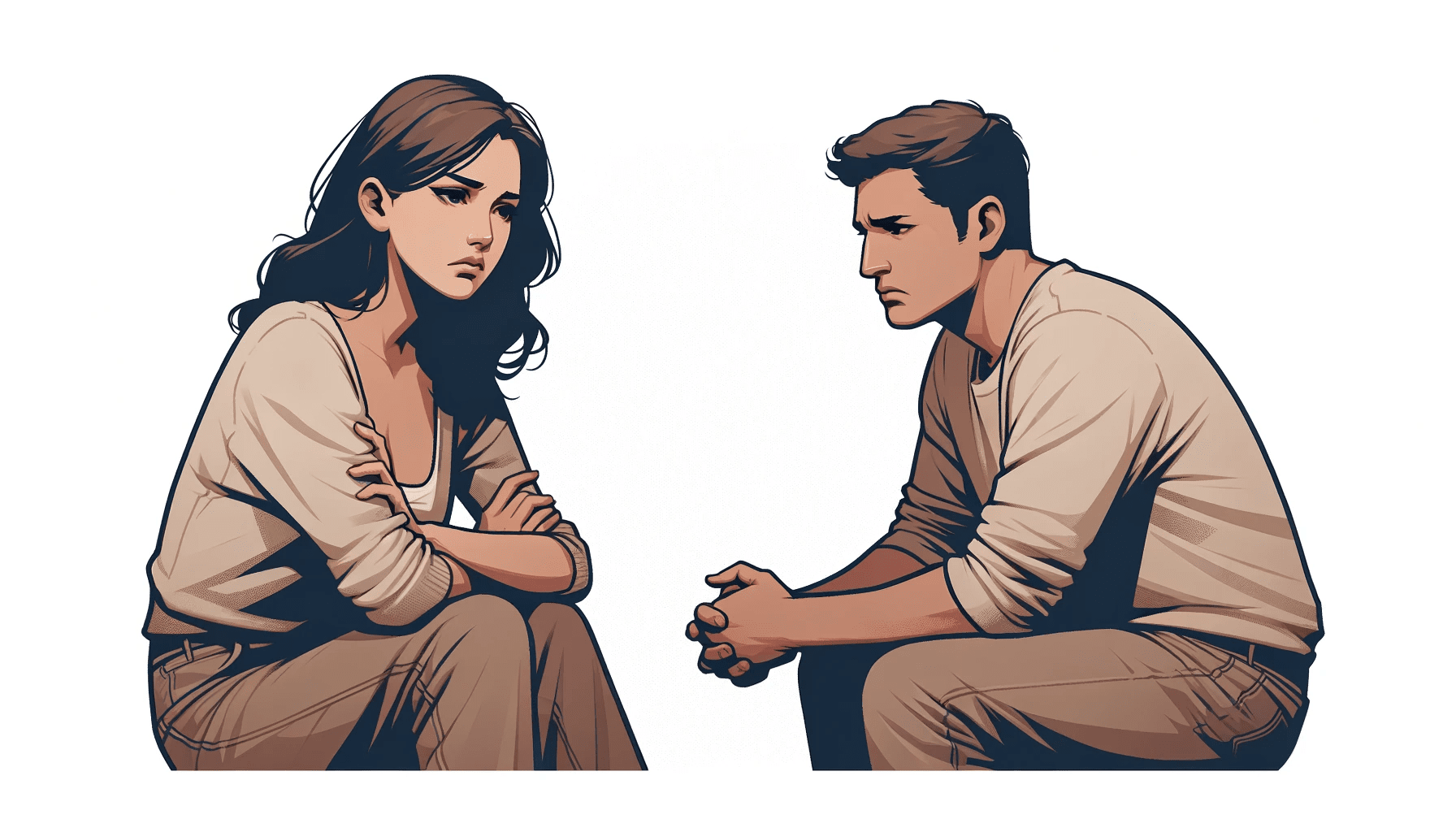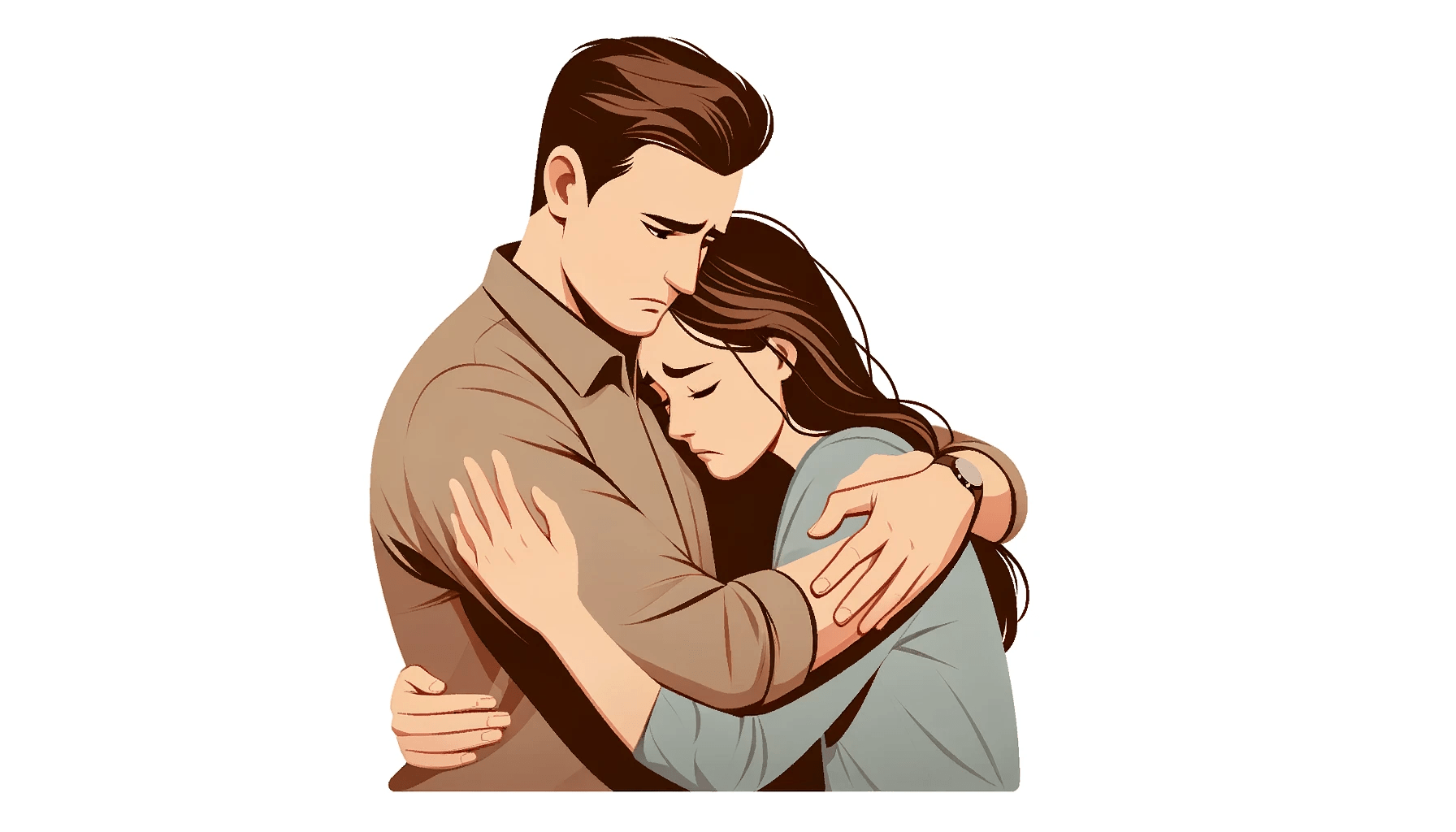Sharing is caring!
Relationships, especially marriages, go through many phases. Over time, the initial excitement can give way to routine, stress, or just the natural changes that occur in life.
Sometimes, feeling turned off by your husband could stem from everyday stresses or changes in the relationship dynamic.
It could be the mundane routines, lack of communication, or even evolving personal interests.
These factors can slowly chip away at the physical and emotional connection you once shared.
Recognizing these issues is the first step in addressing them and finding ways to reignite the spark.
But it’s important to remember that feeling this way doesn’t mean your marriage is doomed. Quite the opposite, actually. Why?
Understanding the root of the problem can be incredibly helpful in bringing about positive change and making your relationship stronger.
In this article, we’ll dive into various reasons that might be causing you to be turned off by your husband and more importantly, discuss how to tackle them.
1. Loss of Emotional Connection
Feeling turned off by your husband can sometimes stem from a loss of emotional connection.
It’s like the emotional glue that once held you close has weakened.
Perhaps you both stopped sharing your thoughts and feelings as you used to, or the daily stresses of life have made it hard to maintain that closeness.
And when emotional intimacy fades, it can lead to feeling disconnected, which often translates into a lack of physical attraction.
Rebuilding this connection doesn’t happen overnight. It starts with open, honest communication about how you’re feeling.
It’s about making an effort to understand each other and rekindle those shared experiences that brought you close in the first place.
Sometimes, just spending quality time together without distractions can reignite the emotional bond.
Remember, every relationship goes through phases. There might be times when you feel incredibly close and others when you feel distant.
Recognizing this as a normal part of a long-term relationship can help you navigate through these phases without losing sight of the love and affection that brought you together.
2. Lack of Shared Experiences or Adventures

A relationship that lacks shared experiences or adventures can lead to a sense of monotony.
If you’re always sticking to the same routine, it’s easy to start feeling disconnected. And this disconnection can sometimes manifest as a lack of physical attraction or interest.
Here’s what you can do about this: Try to inject some adventure into your life. Why?
Doing new and exciting things together can create lasting memories and strengthen your bond. This doesn’t necessarily mean extravagant vacations or daring escapades.
It can be as simple as trying a new restaurant, taking a class together, or exploring a new hobby. These shared experiences can bring a sense of novelty and excitement to your relationship.
The purpose isn’t just about the activity itself, but the experience of doing something together.
These moments can help you see your partner in a new light and reignite the spark that brought you together. Shared adventures can remind you of the reasons you fell in love in the first place.
3. Changes in Physical Appearance or Habits
Physical attraction is a complex mix of factors, and changes in appearance or habits can play a big role.
Has your husband stopped taking care of himself the way he used to? Or perhaps there have been significant changes in his physical appearance.
It’s not shallow to admit that these things affect your attraction; physical appearance does play a role in romantic relationships.
But it’s also important to understand the reasons behind these changes. Is it a lack of effort, or are there underlying issues like stress, health problems, or low self-esteem?
Having a compassionate and understanding approach can help address these issues.
Encouraging and supporting each other in maintaining health and wellness can be beneficial for both your physical attraction and overall well-being.
But understand that attraction in a marriage is about more than just physical appearance. It’s also about the love, respect, and shared history you have. And sometimes, rekindling physical attraction can involve reconnecting with these other aspects of your relationship.
[Related: 12 Red Flags Before Marriage You Shouldn’t Ignore]
4. Communication Breakdown
When you and your husband stop talking about things that matter, it creates a gap in your relationship.
Maybe you’re not discussing your feelings anymore, or perhaps everyday stressors have taken over your conversations, leaving no room for deeper, meaningful interactions.
This lack of communication can make you feel disconnected, and as a result, less attracted to your partner.
Addressing this issue involves making a conscious effort to reopen the lines of communication. It’s not just about talking more but about talking effectively.
Share your feelings, listen to his, and try to understand each other’s perspectives.
Sometimes, simply expressing what’s on your mind can bring back the closeness you’ve been missing.
5. Lack of Personal Space and Independence

Sometimes, feeling turned off can stem from a lack of personal space and independence in the relationship.
How? Well, when you’re always together or your lives are overly entangled, it can lead to a feeling of suffocation.
Everyone needs some personal space and time to pursue their own interests, hobbies, or just to be alone.
Having that breathing room is crucial for maintaining a healthy relationship.
Creating space doesn’t mean distancing yourself emotionally. It’s about respecting each other’s need for independence. This could mean spending time with your own friends, engaging in solo hobbies, or just having some quiet time alone.
These moments apart can actually make your time together feel more special and valued.
Balancing togetherness with independence can enhance attraction. It allows both of you to grow as individuals, which in turn can bring new energy and perspectives into your relationship.
Plus, it can make you miss each other a bit, and as they say, absence can make the heart grow fonder.
6. Routine and Predictability
Sometimes, the spark in a relationship can dim due to too much routine and predictability.
When every day feels the same, and there’s a lack of excitement or novelty, it can lead to feelings of boredom, including in your physical relationship.
It’s like being stuck in a loop where nothing new or exciting happens, and this monotony can make you feel less attracted to your partner.
Breaking out of this routine requires a bit of effort. Try introducing new activities into your life together, whether it’s a new hobby, a trip to somewhere you’ve never been, or even just changing up your daily routines.
Small surprises or spontaneous acts can also add a dash of excitement and unpredictability.
7. Lack of Shared Goals or Interests
Another reason you might feel turned off is if you and your husband no longer share common goals or interests.
In some marriages, couples grow in different directions, and the things that once brought them together no longer do.
And when you don’t have shared interests or goals, it can feel like you’re living parallel lives, and this lack of connection can affect your physical attraction to each other.
To address this, try finding new common interests or goals. It could be anything from taking up a new sport together, planning for a future goal, or even just picking a TV series to watch together.
Shared experiences and goals can bring a sense of teamwork and closeness.
8. Unresolved Conflicts or Resentment

There could be past arguments that were never fully resolved, or perhaps there are ongoing issues that have been swept under the rug.
These unresolved issues can build up over time, leading to feelings of resentment, which can drastically affect how you feel about your partner.
Tackling these issues head-on is crucial. It might be uncomfortable, but addressing conflicts and working through them is essential for the health of your relationship.
This might involve having some difficult conversations and being willing to listen to each other’s grievances without judgment.
In some cases, seeking help from a counselor or therapist can provide the guidance needed to work through these issues.
They can offer tools and strategies to help both of you understand each other’s perspectives and find a way forward.
Resolving these conflicts can lift the weight of resentment, making room for renewed attraction and affection.
9. Overwhelming Daily Stress
Daily stress can be a major factor in feeling turned off by your husband.
When you’re both caught up in the whirlwind of work, household responsibilities, and possibly parenting, it can take a toll on your relationship.
The constant pressure and fatigue can leave little energy for intimacy or even basic affection. It’s like being so busy swimming that you forget to enjoy the water.
Managing stress involves teamwork. It’s about finding ways to support each other during stressful times.
For instance, you could divide the household chores more evenly, setting aside time to relax together, or even seeking external help like therapy or counseling.
Finding ways to de-stress together can also bring back some of the fun and lightness in your relationship.
Remember, it’s important to communicate about your stress. Often, just knowing that your partner understands and empathizes with what you’re going through can make a huge difference.
10. Lack of Appreciation or Acknowledgment
Another reason you might feel turned off is if you’re feeling unappreciated or unnoticed.
Everyone wants to feel valued and acknowledged, especially by their partner.
Hence, if it seems like your husband doesn’t appreciate the things you do or doesn’t acknowledge your achievements, it can be a major turn-off.
It’s not just about grand gestures; it’s the small things too, like thanking you for a meal or acknowledging your efforts around the house.
Addressing this issue involves communicating your need for appreciation. It’s important to express how these acknowledgments make you feel valued and loved.
Encourage your husband to share his needs too.
Sometimes, showing appreciation is a two-way street; when you start acknowledging each other’s efforts, it creates a positive cycle of gratitude and affection.
Don’t forget that people have different ways of expressing appreciation.
While you might expect verbal acknowledgments, your husband might be showing his appreciation in other ways.
Understanding each other’s love languages can be a game-changer in how you perceive and receive affection and appreciation.
[Read: 12 Signs Your Husband is Disgusted by You]
What to Do When You’re Feeling Turned Off By Your Husband

1. Reflect on Your Own Needs and Desires
Taking time to reflect on your own needs and desires can be incredibly helpful. Ask yourself what might be missing or what has changed in your life and relationship.
Understanding your own emotions and needs is crucial in addressing any disconnect with your husband. It might be about personal growth, changes in your lifestyle, or even unmet emotional needs.
Once you have a clearer understanding of what you need, it becomes easier to communicate these needs to your partner and work together to find solutions.
2. Talk to Your Husband About It
When you’re feeling turned off by your husband, the first step is to open up a line of communication.
It’s about sitting down and having an honest conversation about how you’re feeling. This doesn’t mean blaming or criticizing him, but rather sharing your feelings in a respectful way.
It’s important to talk about what you both might need or want differently in the relationship.
Good communication can often clear up misunderstandings and help you both understand each other’s perspectives better.
3. Spend Quality Time Together
Sometimes, reigniting the spark means going back to basics like spending quality time together.
Plan a date night, a weekend getaway, or just some uninterrupted time at home.
The goal here is to reconnect, away from the daily grind and responsibilities. It’s surprising how a simple change of scenery or dedicating time solely to each other can make a big difference.
This is about creating new memories and experiences together, reminding you both of the connection you share.
4. Seek Professional Help
If you’re finding it challenging to navigate these feelings on your own, seeking professional help can be a wise choice.
A marriage counselor or therapist can provide an unbiased perspective and guide you through the process of understanding and resolving your feelings.
They can offer strategies for communication, reconnecting, and dealing with any underlying issues.
Sometimes, having a third party facilitate these discussions can make a significant difference in improving the dynamics of your relationship.
5. Engage in Individual Activities
Engaging in individual activities or hobbies can also be beneficial. Sometimes, having your own space to grow and pursue interests can bring a fresh perspective to your relationship.
It allows you to bring new experiences and energy back into your marriage. Plus, it can be really healthy for your individual well-being.
When you have a fulfilling life outside of your relationship, it can enhance your appreciation and love for the time you do spend with your husband.
6. Rekindle Physical Intimacy
Rekindling physical intimacy is another important aspect to consider.
Physical touch, whether it’s holding hands, hugging, or more intimate activities, can strengthen emotional bonds and reignite a sense of closeness.
Sometimes, initiating small acts of physical affection can lead to a deeper connection. It’s also helpful to communicate about your physical needs and desires.
This might feel a bit awkward at first, but it can significantly improve your physical and emotional relationship.
Remember, intimacy is an important part of a romantic relationship, and nurturing it can help in overcoming feelings of being turned off.
7. Explore New Shared Interests
Exploring new interests together can bring a fresh dynamic into your relationship. It could be anything from a cooking class to hiking, or even starting a new series together.
These shared activities create opportunities for teamwork and bonding, offering new things to talk about and experience together. It’s not just about the activity itself, but the joy of discovery and sharing something new.
FAQs
Is it Normal to Not Be Turned On by Your Husband?
Yes, it’s normal to sometimes feel a lack of attraction towards your husband.
Relationships go through various phases, and it’s common for sexual attraction to fluctuate over time.
Factors like stress, busy schedules, health issues, or emotional disconnect can affect your sexual desire.
It’s important to communicate openly about these feelings and work together to address any underlying issues, whether they’re emotional or physical.
Remember, it’s a common experience in long-term relationships and can often be navigated with understanding and effort.
Why Am I Not Sexually Attracted to My Husband?
Losing sexual attraction to your husband can happen for several reasons.
It could be due to emotional disconnect, changes in physical appearance, lack of appreciation, or even the routine nature of your relationship.
Sometimes, external stressors like work or family obligations can also play a role. It’s crucial to explore these feelings to understand their root cause.
Often, addressing the underlying issues, whether they’re emotional or related to lifestyle, can help reignite the spark.
How Can I Regain Attraction Towards My Husband?
Regaining attraction towards your husband often involves addressing the root causes of why it diminished.
This could mean working on emotional intimacy, like spending more quality time together, or improving communication. It might also involve making lifestyle changes, like focusing on health and wellness.
Sometimes, counseling or therapy can be beneficial in exploring deeper issues and finding ways to reconnect. Remember, reigniting attraction is a process that requires patience and mutual effort.
Does a Lack of Attraction Mean Our Relationship is Over?
A lack of attraction doesn’t necessarily mean your relationship is over. It’s a common issue that many couples face and can often be worked through.
The key is open communication and a willingness to address the problem together. It’s about understanding each other’s needs and making an effort to reconnect.
However, if efforts to revive the attraction are unsuccessful and both partners remain unhappy, it might be a sign to reevaluate the relationship.
Sharing is caring!
